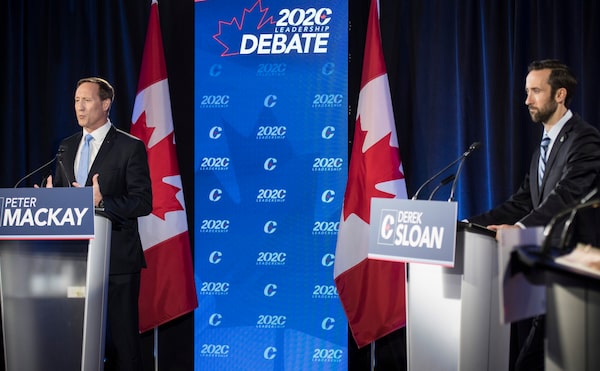
Conservative Party of Canada leadership candidates Peter MacKay, left, and Derek Sloan participate in the English debate in Toronto on June 18, 2020.Tijana Martin/The Canadian Press
The front-runners in the Conservative leadership race set their sights on Prime Minister Justin Trudeau’s record Thursday night as they tried to position themselves as the person best placed to catapult the party into government.
With his résumé of winning his suburban Ontario riding, Erin O’Toole made the case that he can get the party across the finish line in the key battlegrounds where it was shut out in last year’s election. Peter MacKay pointed to his work with Stephen Harper in creating the modern Conservative party, that won three elections, as proof that he can do it again.
In a debate that had no obvious gaffes but also no zingers, the two former cabinet ministers delivered more-measured performances after engaging in several shouting matches in Wednesday’s French-language debate. The change in tone came after Mr. O’Toole was criticized for being too aggressive in his first performance.
“We need a leader who attacks Liberals not Conservatives,” Mr. MacKay said early in the debate. It was a nearly two-hour event where Conservative strategist Tim Powers said none of the four candidates on stage took any real risks.
“That might be good enough in some cases to hold support but not yet a rallying call to join the party or vote Conservative,” Mr. Powers said.
The debate focused on issues from the environment and resource development to systemic racism. The social-conservative issues, such as abortion, that had a lot of attention in the French-language debate got less time in Thursday’s rematch.
The candidates were asked for their thoughts on systemic racism and how they would show leadership on the file. In the debate and subsequent press conference, Mr. O’Toole declined to acknowledge that systemic racism persists in Canada.
Upon repeated questioning by reporters to clarify his position, he said “There is racism in Canada and we have to have a commitment to stamp it out.”
During the debate, Mr. MacKay said Canada has to acknowledge that systemic racism exists. “I grew up in the small town of New Glasgow that has the shame of having excluded Viola Desmond from a theatre,” he said about the civil-rights icon who now sits on Canada’s $10 bill. Mr. MacKay said it’s time to act to address it but did not specify what policies he would change.
The two candidates focused much of their comments on how the party can expand to build a winning coalition of voters.
“To truly reach out to Canadians, we are going to have to modernize, we are going to have to present ideas, solutions, policies that are relevant in people’s backyards and back pockets, and that’s what I’ve been talking about,” Mr. MacKay said in an exchange on how the party can sway middle-ground voters to its camp.
Mr. O’Toole said that before looking outside of the party’s tent, it needed to unite across the different factions within the Tory base.
“All voices in our party are welcome. If we don’t unite first as a party, how do we expect to bring people in the suburbs of Southern Ontario and the lower mainland of B.C.,” he said.
The debate, held in downtown Toronto with no crowd because of COVID-19, was also the first chance for candidates Derek Sloan and Leslyn Lewis to introduce themselves to a broader audience. The two social conservatives argued that the party can build on those values to win more support in the next election.
The race was supposed to end next weekend with a convention in Toronto. But logistical challenges brought on by the pandemic delayed it by two months. Party members will now mail-in ballots by Aug. 21, with the results to be released at a later date.
By playing it safe, Yan Plante, a former senior staffer in the Harper government, said it’s unlikely that the candidates shifted the landscape.
That gives the advantage to Mr. MacKay, he said. Mr. MacKay is likely the most prominent name in the race after serving as a cabinet minister for the entirety of the Harper government. The question Mr. Plante said is whether Mr. MacKay will have enough first ballot support.
The former Progressive Conservative Party leader has angered some social conservatives with his comments about outgoing leader Andrew Scheer’s 2019 election performance. Mr. O’Toole is trying to eek out a victory with support from social conservatives in the ranked-ballot vote.
Mr. Plante said the strategy will make each campaign’s ground games all the more important.
Mr. Sloan, a rookie MP from Ontario, promised to cancel what he called the “sovereignty destroying” Paris climate agreement, defund the World Health Organization and introduce a law to regulate abortion. Canada’s legal position on abortion is “out of wack” with other countries, he said.
Ms. Lewis, a Toronto lawyer, said she joined the race in part because of the rift between social conservatives and the rest of the party. She said she wants to “be the prime minister because I want the country that I grew up in to be here for my children.”
The two candidates are “clearly still working on stepping up to the big stage,” Mr. Powers said.
“They don’t come across as comfortable as Mackay or O’Toole in the spotlight. But Lewis, when breaking away from her talking points, comes across as likeable.”
Know what is happening in the halls of power with the day’s top political headlines and commentary as selected by Globe editors (subscribers only). Sign up today.
 Marieke Walsh
Marieke Walsh Janice Dickson
Janice Dickson